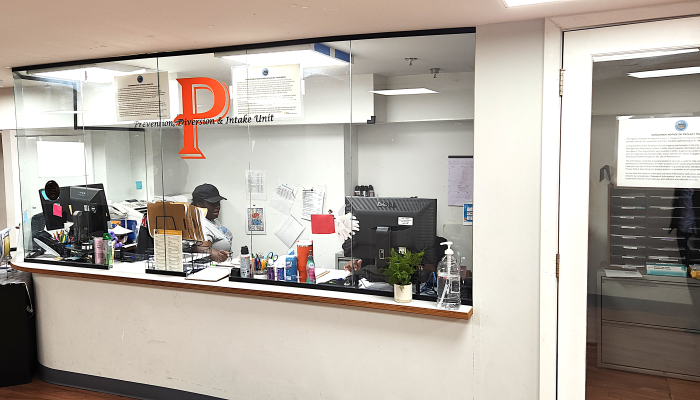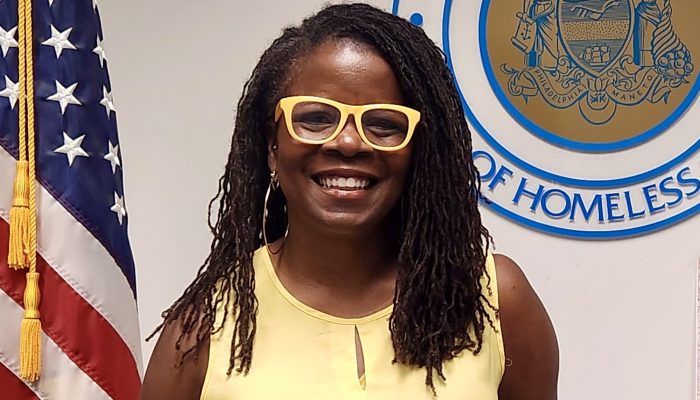The Office of Homeless Services works with the Philadelphia Housing Authority (PHA) and many nonprofits to distribute housing vouchers. It’s one program, among others, we use to make homelessness rare, brief and non-recurring in our city.
Getting a housing voucher can change the life of an individual or family facing housing insecurity. The voucher covers a part of the monthly rent for an apartment or house.
Securing a voucher can be difficult. Once you have a voucher, finding a home or apartment can be its own challenge.
Each woman we highlight below found a place to live with a housing voucher. We asked them to share their experience and insights, hoping the information helps other voucher holders find their unit.
Read the packet
Cecilia moved to Philadelphia from New York City with her son, who has autism. She got her voucher in November of last year while staying in a homeless shelter. She signed a lease for a duplex in December.
“You want to make sure you read the packet you receive with your voucher. It tells you all your rights and what you qualify for,” Cecilia notes, adding the packet also lists your responsibilities. “I have to make sure I renew the voucher every two years and renew my lease every year.”
Cecilia says voucher holders have several tools to help them find units. They should not rely on just one tool. “The only thing I can say to people is you have to use all the resources you can, follow any tips you might get. Realtors may have a lot of clients, and they might forget about you sometimes. You really have to put your feet on the pavement and find your own,” she insists.
When Cecilia was in the shelter system, a staff member handed her a booklet. It had numbers for different landlords, realtors and developments. She telephoned all the phone numbers, and one call led to the home she lives in now. “When I left the shelter, I gave the list to a lady who was in the room next to me,” she recalls. “I said maybe this can be helpful to you too.”
Good communication
Shirah, 24, was “house hopping” before a housing voucher allowed her to find an apartment of her own in the city’s southwest. The nonprofit Valley Youth House helped her secure a voucher in December 2021, and she signed her lease this March.
“It’s better to call landlords, or even send them a little text message telling them you’re interested in the property. They often pick up the phone right away, or give you a call back,” Shirah advises, saying emails are too easy to miss or ignore by landlords.
A lot of landlords told her they didn’t accept her voucher. This is a discriminatory practice many people experiencing homelessness face. But there are landlords out there who take housing vouchers. Reaching out to several individuals is important.
Shirah found her apartment on AffordableHousing.com. “At first I didn’t think I was going to get this unit, because of my credit. But somehow I was able to get it. They worked with me,” she said.
Since moving in, Shirah has felt frustrated at how long the unit’s management company takes to respond to maintenance requests. She says finding a good landlord is as important as finding a property. “Make sure the landlord is easy to work with, and communicates well,” she says.
Time management
Shakira is 21 years old. The housing voucher she received in September allowed her and her four-year-old son to stay in their apartment in North Philadelphia.
She says social media is a great way to find affordable housing options. For example, the Facebook page “Philly mom’s helping mom’s” is full of good resources and ideas. “I saw a post where one mom asked: ‘Do any other moms know how to find Section 8 housing?’ She had a voucher and was running out of time. I was in her same predicament, so I started reading the comments and found all these websites,” Shakira remembers. “I just started going to all of them, and landlords eventually started reaching back out.”
“Apartments.com has affordable housing listings, and Facebook Marketplace also has a lot of houses. On Instagram, I found Jackson Rental Homes, and the majority of those properties are Section 8’s,” she points out.
While online searches seem to provide unlimited options, Shakira says that is not the case, and time management is very important. After she got a housing voucher, she had to quickly find a unit to move into. “You have to keep on, and apply to as many as you see,” she says, adding that sometimes you have to settle for something less than ideal. “A roof is a roof, a house is a house.”
Knowing yourself
Najee, 64, is a transwoman of color. She was living in Morris Home, a residential recovery program for the transgender community. After an eight-month long program, a housing voucher allowed her to move into her own place in West Philly.
Unlike Shakira, Najee admits she is “not a computer whiz” and would be unable to find an apartment online. Most voucher holders must find a place to rent without outside help. If you are lucky to have a case manager, Najee suggests working with them closely. “If I had any questions, I would just ask Noreen for help,” Najee says, in reference to her case manager at Morris Home.
She says finding the right unit requires taking a close look at the space – as well as at yourself. “Don’t jump at the first thing you see. Have a little patience,” she warns. “I had to look at the neighborhood and ask myself, ‘Okay, can I live here? Are there things here that will distract me, maybe test my sobriety?’
“You also have to see what’s inside the unit. Is there a washer and dryer in the building? It’s important to know what you want, but also what you can and can’t live with.”
Picture: Najee Gibson moved into her apartment with the help of a housing voucher and her case manager.




